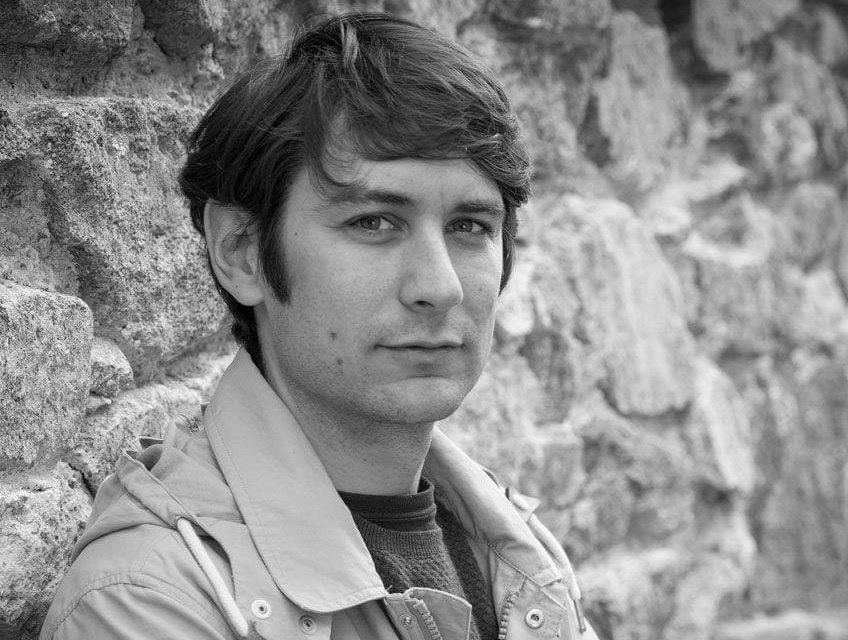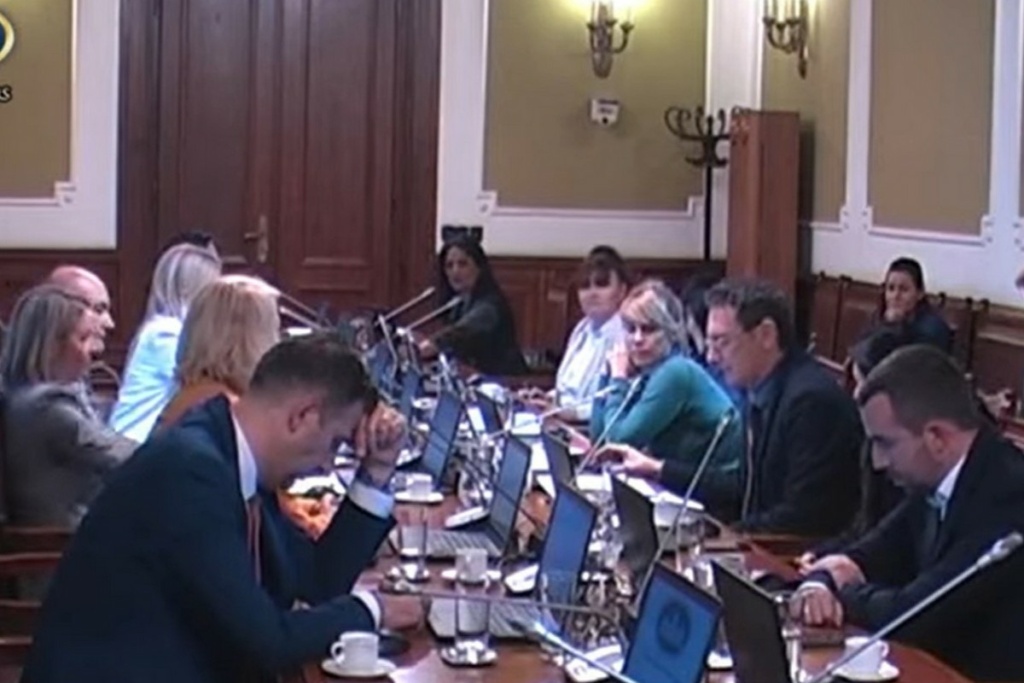
Pavol Salaj (photo: Ctibor Bachraty/Biela vrana)
A new Head of European Union & Balkans Desk of Reporters Without Borders (Reporters Sans Frontiers- RSF) is Pavol Szalai, whose credentials include work for a foreign policy magazine Zahraničná Politika, daily Sme and EURACTIV Slovakia. From 2014 until 2016, Szalai worked in a communication team of the Slovak Foreign Ministry, which he quit over rigged public tenders within Slovakia’s EU Council Presidency. He blew the whistle on the frauds together with his former colleague Zuzana Hlávková and Transparency International Slovakia. The Ministry’s action was later criticized by the Supreme Audit Office for lacking transparency. In 2017, a group of Slovak NGOs awarded Pavol Szalai and his former colleague the prize White Crow for whistle-blowing on the EU Presidency tenders.
Cenzolovka: What are some trends that RSF is currently observing when it comes to freedom of the press? How is the situation changing with the global C-19 pandemic?
Pavol Szalai: Most people are in quarantine, but the enemies of press freedom are not. We observe that governments, as well as other actors, abuse the sanitary emergency to violate press freedom. Their actions range from repressive laws, allowing arbitrary prosecutions, to hate campaigns against critical journalists, resulting in physical attacks, to discrimination against independent media in access to information.
This is happening in countries that had authoritarian reflexes before – like Hungary or Serbia – but also in places that are not necessarily considered problematic before the coronavirus – like Slovenia.
Hungary passed a law, which punishes the spreading of fake news by five years in prison, while the government can rule by decrees for an indefinite period of time. Coupled with a discreditation campaign, this legislation risks destroying what has left of independent media in the country.
It appears that each time that the Serbian government makes one step forwards, it makes one step backward.
In Slovenia, the new right-wing government has participated in a smear campaign against RSF’s correspondent and investigative journalist Blaz Zgaga since he sent in a Freedom of Information request on COVID-19. Blaz Zgaga now receives death threats. Following Prime Minister’s accusations that the public TV, RTV Slovenija is lying, its crew was attacked by an unknown perpetrator.
Finally, some governments, including Hungarian and Serbian, refuse to provide information to critical media. As if their audiences did not have the same right to reliable information on the coronavirus, a matter of life and death, as have those of the pro-government media.
Further west, the Spanish government did not resist the temptation either and tried to limit the conditions for critical journalists by forcing them to pose their questions for press conferences in writing and in advance.
Fortunately, journalists rebelled – RSF supported them – and the government now takes questions live via videoconferences. Governments everywhere should understand the obvious: by informing the public, media play an indispensable role in fighting the pandemic.
We asked the government to drop the accusations against journalist Ana Lalic
Cenzolovka: The latest RSF’s report opens with the case of journalist Ana Lalic from Serbia. How would you asses the present media situation in our country?
Szalai: RSF appreciates that the Prime Minister apologized, that the government withdrew the decree on which the arrest of Ana Lalic had been based, and that the journalist was released from custody. However, we still ask the authorities to drop the accusations against the reporter and grant the secrecy of her sources, which might have been compromised by the seizure of her computer and phones.
We still ask the authorities to drop the accusations against the reporter Ana Lalic and to grant the secrecy of her sources, which might have been compromised by the seizure of her computer and phones.
In the meantime, the government has given RSF an additional reason to worry: it obliges media to send their questions in written instead of answering them live. This is clearly an unnecessary measure which undermines press freedom. It has already been overturned in Spain.
We are also very concerned by the smear campaigns against independent media led by websites such as Prismotra and pro-government media like Kurir and a by recent death threats against Direktno.rs.
It appears that each time the Serbian government makes a step forward it then makes a step backward. At the meeting in January, RSF handed to Serbia’s President very concrete recommendations for improving press freedom in the country. We hope that in the light of the upcoming 2020 World Press Freedom Index the government’s effort will accelerate.
Cenzolovka: Is it accurate to say that Serbia is the only country in Europe that has detained a journalist under the pretext of Covid-19 pandemic?
Szalai: According to our information, Serbia is the only country in Europe (European Union and Western Balkans) where a journalist has been arrested under the pretext of the coronavirus. However, we have also seen a couple of arbitrary detentions. In Poland, the journalist Włodzimierz Ciejka had to spend a few hours at the police station after he had filmed a small protest against the government. More recently in Kosovo, Editor-in-Chief of KoSSev Tatjana Lazarevic was detained while being on a COVID-19 reporting assignment.
Hungary and Serbia refuse to provide information to critical media. As if their audiences did not have the same right to reliable information on the coronavirus, a matter of life and death, as have those of the pro-government media.
Cenzolovka: The murder of investigative journalist Jan Kuciak just got its resolution at the court. Could you tell us more about the whole process?
Szalai: In the case of the murder of Jan Kuciak and his fiancée Martina Kusnirova, two persons were condemned in the first instance. One of the two assassins, Miroslav Marcek, pleaded guilty and was condemned to 23 years in prison.
One of the intermediaries, Zoltan Andrusko, who cooperated with the police, was sentenced to a 15-year prison term. However, we are still expecting the condemnation of the presumed mastermind of the assassination, Marian Kocner, as well as one of the other possible intermediary Alena Zsuzsova, and the other suspected assassin, Tomas Szabo. They are all in custody.
The successful investigations and especially the trials with Marian Kocner have sent an important signal against the impunity of crimes against journalists in Slovakia and abroad. I hope this positive dynamic will help to shed more light on the disappearances in the 2000s of two other journalists, Miroslav Pejko and Pavol Rypal, which have not been thoroughly investigated by the police.
The media is an irreplaceable pillar of democracy
Cenzolovka: You have become RSF’s new Head of European Union & Balkans Desk. What are some of the things that you would like to see changed or improved in the Balkans?
Szalai: In my role, I will try to continue in RSF’s action in the region. We will further monitor the situation in the individual countries, defend press freedom on various occasions and help journalists that are threatened.
I cover both the Western Balkans and the European Union because we believe the future of the region is European. We do have similar problems, although their gravity differs across countries and changes in time. In Western Balkans, as well as in the EU member states, press freedom is threatened by repressive governments, mighty oligarchs, economic crises, aggressive rhetoric online and offline, and, unfortunately, also by physical attacks and murders.
Although media are an irreplaceable pillar of democracy, journalists are not safe even in democracies. The COVID-19 crisis is a new reminder of this sad paradox, in the EU and the Western Balkans.
SLOVAKIA DOES NOT TOLERATE CRIMES AGAINST JOURNALISTS
Cenzolovka: Less than two years ago, a journalist Milan Jovanovic was nearly killed when his house was set on fire. The investigation is pointing to a local tycoon and a party dignitary, though some witnesses are now having second thoughts. Up to date, the only trail for the killing of a journalist in Serbia is the one in relation to Slavko Curuvija killing. Unlike in Slovakia, we waited for 15 years for the courts to react. What are the differences between Slovakia and Serbia, considering that our two countries have a somewhat similar culture and history?
Szalai: In Slovakia, there is no climate of impunity for crimes against journalists, especially when it comes to murders. Worried about public support, politicians must condemn the evident crimes and do everything for their investigation.
The murder of Jan Kuciak and Martina Kusnirova created an unprecedented shock in the Slovak society, which burst into streets, led by the young generation, giving rise to the biggest protests since the fall of Communism.
Slovaks are also attached to the membership in the European Union and their international image, which created additional pressure on the Slovak politicians and helped the investigation. European Parliament sent its missions to Slovakia to make sure that the investigation is not under political influence, and Europol provided significant technical assistance to Slovak police.
In the meantime, organizations like RSF and international media attracted the attention of the whole world. These three factors – the pressure of the public, EU membership, and international attention – reinforced each other and played a decisive role in bringing the investigation to a successful end.



 Silovanje ili cenzura: Na šta to smrdi Pepe le Tvor?
Silovanje ili cenzura: Na šta to smrdi Pepe le Tvor? Medijski amandmani umiru u skupštinskom mraku: Noćno zasedanje Odbora, u četiri čina
Medijski amandmani umiru u skupštinskom mraku: Noćno zasedanje Odbora, u četiri čina Kako ojačati lokalne medije i obnoviti informisanje o radu opštinskih vlasti: Britansko rešenje daje rezultate
Kako ojačati lokalne medije i obnoviti informisanje o radu opštinskih vlasti: Britansko rešenje daje rezultate
Ostavljanje komentara je privremeno obustavljeno iz tehničkih razloga. Hvala na razumevanju.